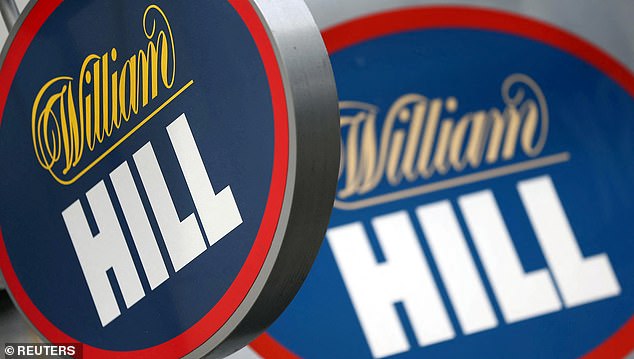William Hill has been fined a record £19.2million by the industry watchdog for failing to protect its customers and stop money laundering.
The Gambling Commission said three businesses owned by William Hill, which was acquired by 888 last year, had insufficient controls in place to protect new customers and allowed some to deposit large amounts without conducting appropriate checks.
The companies’ failings were found to be so severe that the Gambling Commission even considered suspending the betting giant’s licence, the regulator said on Tuesday.

The gambling watchdog said the failings uncovered were ‘so widespread and alarming serious’ that it considered removing William Hill’s license to operate
One customer was allowed to open a new account and spend £23,000 in 20 minutes without any checks, while another customer was allowed to open an account and spend £18,000 in 24 hours, according to the regulator.
The Gambling Commission also found one customer was able to spend and lose £70,134 in a month, one lost £38,000 in five weeks, and another hemorrhaged £36,000 in just four days.
Andrew Rhodes, Gambling Commission chief executive, said the failings uncovered were ‘so widespread and alarming serious’ that the watchdog considered suspending William Hill’s license.
‘However, because the operator immediately recognised their failings and worked with us to swiftly implement improvements, we instead opted for the largest enforcement payment in our history,’ he added.
The fine is the biggest issued by the regulator after the £17million fine handed to Entain in August last year for similar failings.
It was first unveiled by the Daily Mail earlier this month, which reported that owner 888 had already set aside £15million to cover penalties stemming from an investigation by regulators into its ‘social responsibility and anti-money laundering obligations’.
888, which bought William Hill from US-based Caesars Entertainment last summer in a £2billion deal, said the problems which led to the fines related to the period before its ownership.
‘After William Hill was acquired, the company quickly addressed the identified issues with the implementation of a rigorous action plan,’ an 888 spokesperson said.
Will Prochaska, strategy director at Gambling with Lives, a charity set up by families bereaved by gambling-related suicide, said 888 treated the looming fine ‘as a cost of doing business’.
‘Fines won’t stop the gambling industry from deliberately exploiting its customers and driving hundreds every year to suicide,’ he said.
‘Knowledge that this record fine was coming didn’t prevent 888 from acquiring William Hill, they merely treated it as a cost of doing business.
‘The deaths will continue until the Gambling Commission uses the powers it already has to remove gambling firms’ licences and hold individual executives liable for these failures, or until the Government announces significant reforms to gambling regulation.
‘In the UK we desperately need the Government to end gambling advertising and stop gambling companies from luring people to gamble more than they can afford.’
The fine is the latest of several handed out in recent years by the regulator, which last week slapped online operators 32Red and Platinum Gaming with £7.1million fines for social responsibility and anti-money laundering failures.

888 owns online casino, poker and sports betting sites as well as over 1,000 William Hill shops
888, which owns online casino, poker and sports betting sites as well as more than 1,000 William Hill shops, is already grappling with other regulatory issues.
Last month, its boss made a shock exit after it launched an investigation into suspected money laundering on VIP customer accounts in the Middle East.
Chief executive Itai Pazner left after more than two decades, including four years at the top.
Shares in 888 traded down 1.8 per cent to 53.50p in morning trade on Tuesday. They have fallen by around 40 per cent since the start of the year and are down 70 per cent compared to 12 months ago.
The Government has sought to tighten gambling rules in recent years to prevent addiction by capping the maximum stake on terminals and banning the use of credit cards to place bets.
